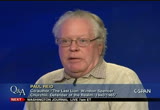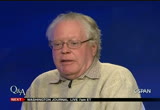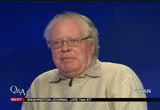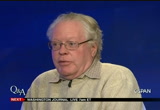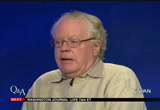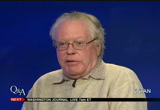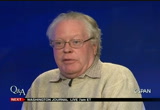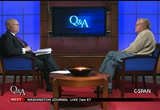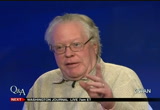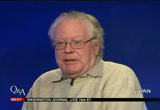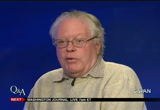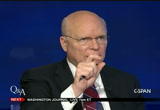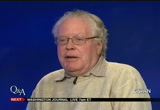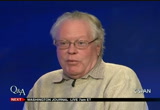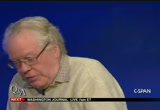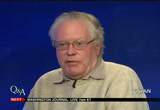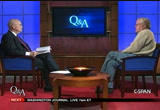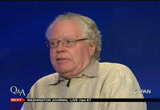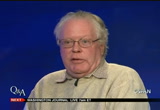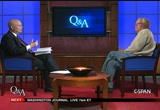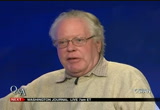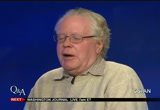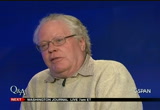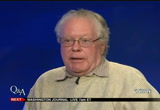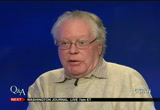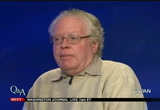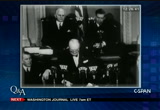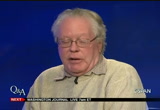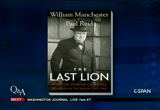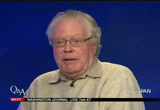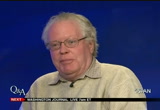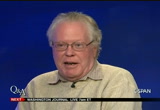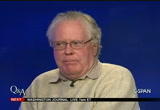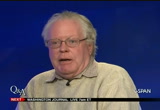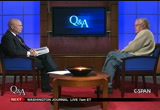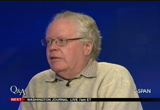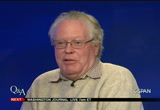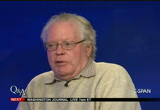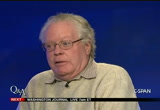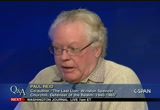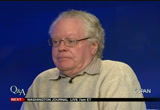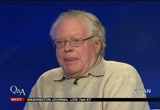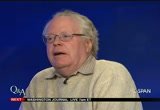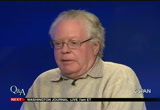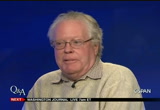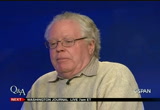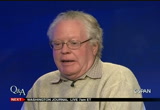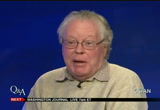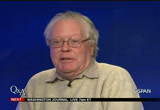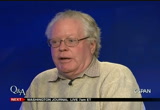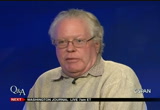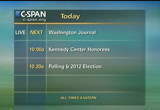tv Q A CSPAN December 24, 2012 6:00am-7:00am EST
6:00 am
the french had essentially been defeated other than the rump army in brittany and the british expeditionary force, 400,000 men strong, half of them were down around britney but 200,000 were the norman spearhead against the germans and in short order the french line collapsed across belgium and british now were left alone at the coast. dunkirk was one of five or six villages that they could escape from, ports. and they did over a week. at first they thought they might get 10,000 or 12,000 out. then every sail boat, yacht, everything that could float was sent over and they got more than 200,000 british troops off and 130,000 french. i found it interesting that several thousand french troops,
6:01 am
maybe 10 or 20, chose not to go. they thought the war is over, we lost and they went home back to their farms. how they fared no one knows. host: whether was your reaction in great britain to dunkirk? guest: churchill -- and churchill did this -- he made a defeat sound as if it was the ost heroic -- and he saeid evacuations, retreats are not victories, he was clear on this. but the way he said it made dunkirk sound like a heroic victory. and the british people came away saying, well, if we can do that, we can bloody well whip the hun. well, they had it backwards. they were running, swimming literally, home without their weapons, without their tanks and jeeps -- they didn't have generals then but trucks and rifles. they came back soaking wet with
6:02 am
no weapons and church ill is telling the paoeeople that we'r now building up what will be the finest army in europe and we will go back. host: in 1940, mid 1940, he is prime minister of great britain. how big at that stage is the british empire? guest: well, it covered gee graphicically about a quarter of the left-hand mass and -- land mass and population. the population was about a quarter of the earth. india, subcontinent. commonwealth and dominion, canada, new zealand, ulster, northern ireland. host: hong kong, singapore? guest: oh, yes. host: how about africa? guest: they had a relationship with egypt.
6:03 am
i thought going into this that they sort of controlled egypt. but the treaty allowed them to go in and administer the country or safeguard the suez canal and they did that. they had in south africa jan smuts and the republic of south africa. they had some somali land, some territories there that the italians just plucked from them. they were completely unprepared everywhere for war. and i think the british army plus the australian army of five or six divisions, new zealand and the canadians, all of them put together, even if they could all get it england were outnumbered by lhitler's army or eight to one. but they were not in england
6:04 am
ready to go back to france. the canadians paid in hong kong and australian and british in singapore. so after dunkirk here was a country like a boxer is down on one knee and the ref is about to call in a day. host: when did the blitz of london occur? . this is actually part of the battle of britain. the air battle, the hollywood battle of spitfires and everything began in bid july, july 10 officially. host: of 1940. guest: of 1940. that is when the invasion scare began. the germans were soften up for the final blow which churchill never believed was coming. never for a minute did he believe the germans would invade. but he had to pursue the invasion scare tactic in order to build up his armies and get
6:05 am
more planes and get equipment from the u.s., which was dragging its feet. the final plan, the german plan, would be to soften air bases then in lit august or september crush the remnants of the r.a.f. it was a good plan but it wasn't working and goring got hitler's permission to bomb the ports. bombing was so ineffective on both sides that meant they would be bombing houses. they did. and churchill said give it back to them. that was the beginning. so, the blitz starts on september 7, i think, the evening. and germans came 81 of the next 82 nights or something like that. and the terror bombing they
6:06 am
feared and predicted began. and there was no stopping the bombers. host: how many were killed and how many wounded in great brita britain? guest: i think about 40,000 to 45,000 londoners and 60,000 throughout then the rockets came. 60,000 people in a country of 47 million, you extrapolate, that would be at the time almost 2 200,000 americans, unimaginable numbers then and now for us in the united states. host: physically what did winston do during that time, where did he live? how did he relate to london and great britain during the blitz? guest: he, with reluctance, left number 10 downing street which was fire trap. if a bomb hit it, that would have been the efpnd.
6:07 am
he went underground and even those rooms were a danger. the deep underground war rooms were a little more safe. so it was a cave with 200 soldiers, his family, typists, generals, map room all still there as many of your viewers know just fascinating with the red buckets and cigars put out and the walls yellowed by cigar smoke over 20 or 30 months. he hated that. when the bombers came and he heard the thuds he would go up to the roof, the worse place to go, and he would look at a flash and count one, two, three, four, five, that is a mile and he would call for his consider and "take me." they would roar through the streets. everyone saying don't do it, mr. prime minister. bombs fall being.
6:08 am
he would go there and get out of the car, talk to people in the street, the survivors, civilians. he was out there among them almost every day and most evenings. and they knew that. he would go to portsmouth around do the same thing. that was his genius. it was rash behavior, he had it do it. host: you said at one point that the lights were supposed to be off but he would smoke his cigar anyway. guest: he either was one occasion there were four of them in the car, coalville, a general, something else and the auto hraoeug auto lights were painted only the upper half and you were not supposed to use them at all if you didn't have to. and he came to a roadblock and the soldier said you there. host: tommy is what they called a british soldier? guest: yes. you in the car you can go no
6:09 am
further. and from the car came go to hell, man. i'm thinking well, coleville was too general, the general was too polite. i think the fourth person feels -- was mr. bevan, the minister of labor, he was from the west country of england and he would not have soundedlike that. it was churchill with a cigar in violation of all rules driving around telling the guards to go to hell. host: what did he think of the french? guest: he loved france and this i found interesting as i did the work. the u.s. versus british versus churchill's take on de gaulle and the french. he felt betrayed in 1940 when the french tried to lure the final british fighter planes over to their side to fight the final battle that they were already losing. churchill kept the planes at home and he felt the french had
6:10 am
lost their fortitude, their soul, five years later de gaulle gave it becom back. he was very disappointed because he loved france and loved the french people. he couldn't speak the language but he recognized the legacy, intellectual, cultural, of francs and it had to be resurrected. host: you connect a bit in here with back in the 1910eu90's nam harriman. connect the randolph and pam ma haeir -- pamela harriman and avril hair man. >> randolph was winston's son.
6:11 am
he could fight, drink. pame pamela, i'm drawing a blank on her family name here. she came from and old english family, very old. back to thomas a beckett which is still a catholic part of england. and the first time she met churchill she had just met randolph. in fact, they met, married, proposed all within a week or so. and she came into chartwell, chump's country home in the tkpwrpbdz where he was painting and she walked up behind him and he turned and she was just 19, very pretty. and the first thing out of his mouth was are you catholic? which is very telling in that country. she was tape aback and said well, we were but we learned our
6:12 am
lesson under cromwell. and he loved her. host: how long feels she married to randolph? guest: well, i think they were married in then 39 -- 1939. somewhere after november of 1940 little winston was been. winston churchill the grandson. the marriage by then was already essentially over. the divorce finally came four or five years later. everyone in london knew in anyone 42 or 1943 or 1944 that the marriage was over. avril harriman came as a special envoy from f.d.r. and his walking orders from roosevelt were to find out everything that we can do for england short of going to war and get it to them.
6:13 am
and randolph was, i think, in the egyptian desert on duty. was a brave soldier. and pamela and randolph and harriman met. they would have to at these weekend dinners that churchill had at checkers, the official home of the prime minister, because by then chartwell is in moth balls for the duration. host: where is chartwell? guest: in kent, 40 to 45 miles southeast of london, lovely green vistas and villages. and checker is also of that distance from london but not on the flight path of the german bombers. host: in 2010 winston churchill iii died of prostate cancer but in 1999 was here and we want to show you.
6:14 am
[video clip] >> finally he was given that monumental kick in the teeth by the british electorate in the hour of victory, the architect of victory. and he took it quite hard. my grandmother said perhaps it is a blessing in disguise to which she said if so very effectively disguised. host: what was his grandmother like, clementine? guest: she didn't like politics and winston's friends. his best friends she didn't like at all. lord beaverbrook and brendon bracken who was a strange irishman who once claimed churchill was his father and churchill didn't do anything to diminish the rumor. she didn't like the gambling winston did before the war in
6:15 am
mon monte carlo. he never did well. she had a nervous temperament her daughter wrote. one year i think they had four dinners alone, 1944, clementine and winston. and if they were at dinner aides were coming in, bombs were falling and the house was full of guests. russian diplomats she doesn't want there. she had a very hard time. i'm not sure -- again i mentioned earlier winston was not sympathetic or empathetic over matters of mental anxiety, that sort of thing. host: what did you conclude about his mental health? guest: that was interesting. i had long talk with my editor bill tphreufpls -- phillips and they warn against a retroactive diagnosis but this whole black
6:16 am
dog thing started in a letter he wrote in 1911. he never used the term again. a and coville and others who worked for him, nannies would say to their children, little kids they are taking care of, the black dog is on him today. host: depression? guest: no, for the little children it was bad behavior or bad day, an expression nannies used, what would be called a bad hair day. it was not as used by these folks something we would call major adult depression. now, whatever churchill experienced in anyone 11 -- 1911 sounded to these doctors like a moderate depressive episode. he got through it. he doesn't mention it any more.
6:17 am
years dirists would say he looked depressed and that created a depression word document and singapore just fell bismarck is on the loose, something else just fell, he is having very bad days and i don't think his cronies were using depression in a clinical sense. winston was utterly destroyed today. he was depressed. so, i concluded that if as freud if you can live and love and work you have your full mental health and he loved his family. he never couldn't work which is a symptom of depression. he never thought nobody loves me or disconsolate and all of the sympto symptoms. ironically he would exhibit some
6:18 am
of them days apart. too much drinking, you know, hyperactivi he wasn't manic depressive. he drank too much for 70 years. so, as a symptom of depression what does that tell you? everything about him is complex, contradicto contradictory. before we move on i have to ask you because in the jim miller piece he talks about your editor bill phillips and says that you and bill phillips have never met each other in person. is that still the case? guest: that is the case. bill phillips is the greatest man i never met. host: explain the relationship. guest: he says he has a thousand mills we ha e-mails we have exchanged. we would talk on the phone.
6:19 am
i was about two years into the project before i met -- well, met him on the phone. host: where were you at the time? guest: i was center asheville, north carolina, at our house and in belmont, massachusetts, outside of boston. i didn't really have a man new script to send him and another year or two would go by and i would send him chunks. we began back and forth with the first 100 pages, the next and next. and we never really exchanged the entire manuscript. it slowly went along. but we would find that as we were in now the seventh or eighth year and working on the last year of the war, 1945, changes there resulted in changes at the beginning of the book. it sounds counterintuitive so i had to go back to something that was said in 1945 about the blitz and we were like wait a minute
6:20 am
and back and forth and back and forth. and bill was very encouraging. we did have this -- bill manchester and winston churchill loft metaphors. and in volumes one and two manchester almost creates a shadow voice that is churchillian with his use of metaphors and i thought it worked. if he was writing about mcarthur y would not use that flower churchillian voice. and churchill's memoirs is full of metaphors. 1941 was the rapids. 1942 was the whirl approximat--. so i started doing that and bill phillips said forget the metaphors, paul. we want to write a 21st book in a voice different than
6:21 am
manchester's. and if churchill use as metaphor and it is in quotes that is one thing but we are not trying to imitate either one of them. and that worked wonderfully. and bill also, on the facts of he told me i'm editing for read ability. if you tell me the bismarck sank on this date in this ocean, you know, i'm going to take your word for it, paul. he was not editing as newspaper editor does. that was a learning experience for me. my editors, if i wrote a feature story about the bismarck, they would say verified and sank on this day and this ocean and this many people died and the write ability was not of their highest concern. host: do you and bill phillips have any plans to meet? guest: yes. well, no hard plans. i was going to meet him this very week and i had some dental issues that resulted in
6:22 am
canceling the boston tour. i would love to meet him. my dream is at some tphaoepblg seafood -- new england seafood place because i miss that and he could pick up the check, of course. host: how many times -- i know you say that winston churchill traveled to the united states 16 times. how many times did he ask f.d.r. to get in the war? guest: at one point i thought am i exaggerating and i thought no, i'm not. he took to begging. he asked, cajoled, he asked for 50 destroyers. f.d.r. dragged his feet. first he said no. then he said maybe. then by november of 1940 the first five or six of the 50 dribbled in. they were rust buckets and virtually obsolete. which roosevelt told t"new york
6:23 am
times" and congress. he said we gave them junk and we get six or seven caribbean naval bases from the empire. at one point that summer i believe churchill wrote a letter and asked roosevelt to declare war. that is how desperate he was. and so after a few brandies in t the co vilville diaries churchi says they want to us bleed to death and pick up everything that is left for free. at one point they were thinking around the dipper table of having everyone in england melt their wedding rings because it might raise $8 million or $10 million of gold and use that to buy american goods because it was all cash and carry, to shame the americans. they didn't do that. host: how much did winston
6:24 am
churchill expect japan to get into the war? guest: one of the things, in doing this, i had to lock at what is he interested in? what is in his head. try to place churchill in his tim times. he was interested in norway, sumatra, not japan, not the pacific. his knowledge of the geography, the politics, the military situati situation, was not there. and he admits in his memoirs in order to imagine a picture of a theatre of war or what have you, you have to have some knowledge to let your imagination run three. and he didn't and he admitted that and he paid dearly for it. he thought the japanese were a meek race who couldn't see well, couldn't shoot straight in an airplane, were bad fighters,
6:25 am
would never have the tim merchantity to attack the british empire. and he people that. they will not attack us. how could they possibly contemplate that. host: what was his reaction when the japanese bombed pearl harbor? guest: that he just won the war. host: that was december 7, 1941. here he is in front of the congress joint session on the day after christmas, 1941. [video clip] >> we have been inflict ed upon the nazi tyranny and it has bitten deep and will fester and inflame not only in the nagging body but the nagging minds the boastful mussolini has crumbled already. he's now but a lackey and a
6:26 am
surf, a mere aou continue sill of his -- aou utensil of his master's will. japan should in a single day into war against the united states and british empire. what kind of people do they think we are? is it possible they do not realize that we shall never cease to persevere against them until they have been taught a lesson which the world will never forget. host: right over his left henry wallace, vice president of the united states at the time. what impact did that speech have on the united states guest: we were in the war. whether clutch came or not
6:27 am
america was rages against the japanese, not the germans. the first week pearl harbor. then hitler made the decision to declare war on the united states when he didn't have to and that, churchill realized, meant the end for hitler if the americans went to europe first. the policy of germany first then japan had to be worked out. which is why churchill was in washington that month. i think americans always liked churchill. he had been speaking in america for 20 years. was american. guest: his mother was american. he was well known on the lecture circuit and now here he is as prime minister. they were familiar with him. i think he came out of that speech that day knowing he had
6:28 am
an ally and americans took a liking to him because they were very wary of churchill that all he wanted were his colonies become. b not liberty or not roosevelt's four freedoms but to recapture everything the japanese had taken from him by using american boys and that americans resented and they were wary of that host: we are about out of time. when did you finish this? guest: early this year? host: early 2012? guest: yes. and about six months of copy editing and final editing with bill phillips. host: out of all the characters in it besides winston chump if you were -- churchill if you
6:29 am
were going it write another book who would it be? guest: admiral king comes to mind. and a nod to my dad who was a navy guy. fascinating character. host: will you write another book? guest: yes. i'm not sure when it will be yet. i do have an idea in -- my editor likes. not biography and not in world war ii. host: but we are going to keep until you decide? guest: i think so. because it is such an obviously good idea and we are afraid somebody else will do it. host: paul reid is our guest the last lion written partially with william manchester. guest: this is not glib. bill is in there. without bill there is no third volume. regardless of his notes. william manchester is in there. and i told him i wouldn't let
6:30 am
him down and i have not let churchill down. i think i kept my promise. host: can you remember the exact moment that you said to going to do s, i'm tkpwg t what william manchester wants me to? guest: i think it was the morning after he asked me. we event up to his office at wesleyan and he put together a few more moments. he sent me home with a suit case of source notes and notes and encyclopedia of military terminology. and i thought again, i can do this. i know about the blitz. i have 100 books on my own shelves about world war ii and african campaign and samuel elliot morrison's official history of the naval battles, u.s. navy. i thought i can do this. somewhere along the lines i realized i don't know what bill
6:31 am
wants me to do. and we did discuss this somewhat. he said you have to put your man in his times. you have to have the detail of city life and country life and what were the roads like, what were the airplanes like. were they pressurized. all of the details have to be there so the character can move through his world and the reader understands and has a feel for it. host: how much reading -- i don't know if you can quantify it -- how much reading did you do? and where did you do it? guest: i had a nice library in the house we bought with a fair place and view of the blue ridge mountains and i had five desks set up in a u with all the material manchester used to cut and paste into his tablets, i had the books, plus speeches and
6:32 am
memoirs that were not available when bill was writing. off to the side i a chair, in the dining room a couch and i would take two or three books and notepad and if for instance it is the week before the invasion of russia, mid june of 1941, i've got all the diaries piled up next to one chair, another of all the recollections, speeches churchill may have made, telegrams to roosevelt, warnings to stalin. and i approached it and i told bill phillips this -- host: your editor? guest: yes, my editor bill tphreupls. as if i was making a quilt. and i think this got a little off in the "new york times" artic article, that i would focus on that story that week, the invasion of russia. well, there was always something else happening that week, too. now we've two or three
6:33 am
stories that have to be intertwined and i can't go down too far in the road to august of 1941 with the russian front and ca come all the way back to june 20 then go down to august with the african front. it wouldn't work. so, a read a lot. i bought harriman's memoirs. bill man westchester, in his notes, would xerox a page and cut out a little paragraph and 50 pages later you may find another paragraph from harriman's family worries but there was no context. with became before, what came after. clearly he wanted to use something from that excerpt, which kind of pointed me in a direction. but when i have 5,000, 6,000, 7,000 pages of such directions. so i read harriman's memoirs.
6:34 am
host: how much of winston read, the did you books that he wrote? guest: i used his six volumes of war memoirs throughout and marked them up. if we were in the week of the russian invasion i went to churchill's memoir to see his take on t. because his takes, as he said, this is not a history. this was his case in his memoirs. and by omission and commission there are lots of shadings, errors. you can't take winston at his word. so, i pretty much read his memoi memoirs. pretty much in sequence. host: did you read -- william manchester -- excuse me -- william manchester's first two volumes? guest: i read them when they came out and i was one of those 1989, i eco back in 1988, still have my copies. i reread
6:35 am
them the first, say, 100 pages of both and last 100 pages of the seconds volume a couple of times in the last eight years. the preamble i did, bill phillips and i came up with this and actually bill came up with it first. he was in some of mr. man comets's pages and said paul, we've got something here on page 90 of bill's pages that really should go in a preamble. it is a character sketch. we are already 90 pages in the book and we are hearing churchill's favorite scotch is johnnie walker red. let's patrol around and pick up these paragraphs, these outliers, and put them together and i think of the first 35 or 10 pages, eight or 10 are bill
6:36 am
manchester and i fleshed them out with the alcohol and everything to give the reader a sketch of winston like a movie trailer sketch so that when you start the book you have a feel for the guy. you are not going to be surprised when you find him having four brandies on page 50 that does he do this every day? you already know that he does. and it was a way, too, because we wanted this to be a san stand-alone book. you are under no obligation to buy the first two volumes. it is a stand-alone story. host: have u eyou ever met mart gilbert? guest: no. host: have you ever talked to him? guest: no. i spoke to sir skwrpb keegan. he was very encouraging. he has now left always. i spoke to the great grandson
6:37 am
randolph. he is in his early 40's. and winston iii as people called him lived in west palm beach. we got to know even other pretty well. he was a good source. we would go out to lunch and he would talk about his grand father. host: i counted in the index 16, 17, 18 interviews that william manchester did but all in 1980. then i counted not other than a half dozen that you did, obviously recently. who did you talk to that helped you? guest: well, a lot of the people bill spoke to are gone. i spoke to the grand son, winst winston. and to lady soames, the daughter mary. i spoke to -- i don't know who else might be in there. one fellow i spoke to no one will know is dr. porter crow. he was a g. eufpi. and later bea
6:38 am
writing english professor down sou south. he had been bay i don't know netted and he told stories that were marvelous and it was from porter that i learned slip captains would allow the troops embark to play records on the p.a. system but one record most captains wouldn't allow is bing crosby singing "i will be home for christmas." host: the famous white christmas? guest: yes. host: i see you talked to andy rooney. guest: oh, yes. and these cameos. i called up mr. rooney's office about three years ago i think if the date is there. he got on and i said in a nutshell churchill hero, villain, clown. he said greatest man in the 20th century, hero. then he told a story of
6:39 am
stumbling almost if he made a left turn that day he might have been crushed at the bottom of the underground escalator where the german bombs fell and he went on about taking missions, you know, in d-17's and -- b-17's and b-24's. i asked him with your colleagues dying around you every night british go out and every day the americans go out and some don't come home, you know, you still kept churchill in high regard. he saeid absolutely. one other family i call, i called the son of tip o'neill, tommy, who is a friend of my brother's. i said tommy it just occurred it me in your house growing up back in the day your father feels the consummate irish politician from b, what was the take on chu churchill. he said great man, great man. no irish-english antipathy there.
6:40 am
host: how many hours did you spend and how many different times did you spend with william manchester? guest: we knew each other for about five years. i visited i'm going to say, two, three, four times a year. sometimes to do a story. my daughter was at umass. he lived in middletown. when john-john kennedy died he had none john-john and as part of that story i went up to talk to bill. 9/11 i went up to talk to a f.b.i. agent i knew in boston and stopped at bill's to get a take of a historian. and we were just friends. we would have dinner, watch the red sox. host: what was he like? guest: well, i forget who i have told this story. if i told it today, tell me. the first night i met him he and
6:41 am
the old marines were sitting around talking about old marine stuff. host: you had gone up there with these marines. guest: to do a feature story. there was a knock on the door around 10:00. that was late. young woman from wesleyan, a student with two books of man westchester she and the old wanted him to nscribe to her father or maybe her grand father who was a world war that vet. manchester invited her in, sat her down, offered her tea or wine and five marines talked about the war and she listened for two hours and probably got a story she would never gets again. and i just mets him hours earlier. and i thaought this is a generos man. and i always believed that. he would call my little boy patrick reid who helped me did the book, he is 20 now. and bill would call pat and they would talk about history and bill would call me back and say that little boy is pretty smart. things he didn't have to do. i noticed that. host: william manchester died at age 82 in 2004. winston churchill died age 90 in
6:42 am
1965. how old are you? guest: come on! 63. host: that was in "new york times" peeiece. guest: ok. host: they had you 62. guest: maybe he talked to me before my birthday. he should have asked with day were you born. i'm 63 now. host: the thing i want to ask you rb you, interesting to me, "new york times" article came out november 4 by james miller. how much impact has that had on your book tramples -- travels. do you finds everybody has read that? guest: i heard from friends and relatives and folks i had not heard from in years. but no, people might say nice article in the "new york times" and i would say yes, i appreciate it and pretty well told. host: talk about the money side. that you had an advance of $200,000 and that you, over a
6:43 am
nine-year period needed more money. how severe was that? guest: well, again, over the last eight or nine years a lot of people in a lot of jobs with a lot of goals chasing a lot of dreams are doing whatever they have to do and that is the america we have lived in the last six or seven years. and i wasn't going to quit so we did what we had to do. and it gets stressful at times. but again there is a goal, there's a dream. there are people, the publisher, the readers, churchill, manchester, who i can't let down, can't afford to let down. so, i -- host: is there a promise that there will be more money now that the book is out? guest: i promise? host: yes. is that advance in unless this become makes enough to pay you
6:44 am
more? guest: that is it. i mean that is the deal in publishing, advance. host: my point of asking is how do you live? guest: well, now is a time, now that the editing and -- all summer right up to going to the printer in september only couple of months ago, you know, we were working eight-hour days on fixing the review copy and getting ready for print and now i have told some folks, scott eiman wrote a nice story at the palm beach post and said what are you going to do now. i said i have a couple of become ideas in mind. but i would also, after my years in journalism and using this as kind of a criurriculum vitae i would like to teach writing somewhere. that would give me the business to, you know, keep the income
6:45 am
fixed so that i can take wild gambles at writing another become. host: my question is if you are talking to somebody out there watching this whole thing and there was a lot of interest in the fact that you were doing this, is it, you know, how hard is it? was there a time when you thought the roof was caving in on you, that you were not going to be able to make it financially? guest: no. because thank goodness for good credit. my daddy told me that 50 years ago. paul, never bounce a check. get good credit. i tell my kids that. pay in. and with good credit you can chase your dreams. host: where did you meet your wife? guest: at a july 4 picnic in anyone -- 1996. we were both divorced. and she lived in massachusetts on the coast and i'm a new
6:46 am
englander and i began -- i had sold a manufacturing company and was doing some free laps -- freelance columns and traveled abroad and i again at the post as an intern in february of 1996 and the smart money in the office pool i found out later there 46-year-old guy is not going to move from boston to be an intern. but i wanted to be a newspaper man. host: so? guest: i was an intern. host: for how long? guest: i think 10 weeks was the internship. and i began i think january 6, 1996. and there were other interns there who were 22 years old and i'm 46. i got kids and i'm buying a house with my half of the old divorce settlement.
6:47 am
i have a new which hatphnew wi. i was an intern. was covering the county fair and cooking contest and there was a cow at the fair whose skin had a map of mark on it. i remember the first presidents day weekends i went into the editor's office and said have a nice weekend i will see you tuesday. what are you talking about? it is a holiday, presidents day. you don't get a holiday. i have got my ticket bought and he let me go. host: you were harvard extension graduate. guest: yes. host: bachelor's? guest: yes, liberal arts with a history bent to it. host: what year? guest: 1990. host: what had you done in your early life, what kind of work? guest: how early? when i was 10 i didn't shovel snow properly.
6:48 am
when i was 11 or 12 i was not mowing the lawn right. host: 20 or 25. guest: bar tended, played in a pretty good blue grass band. upstate new york. host: whether did you practice i? guest: i played guitar. that was a good band. some of the people who sat in with us have gone on to stardom. russ barrenberg. anyone who saw the civil war documentary knows the theme and he's the guitarist on that. i bar tended, worked in a cat food factory. that was gruesome. host: how long? guest: five or six months. they demanded 60-hour weeks. host: but during there you didn't have college degree? guest: i left ithaca college after a couple of years in the late 1960's.
6:49 am
i thought sooner or later -- i loved to read and study. i took my books everywhere where me. host: how many children by your first marriage? guest: three. george, marri and patrick. patrick is just 20 now. he is at st. john's at annapolis. host: at any time take after his father whether he would study classical education, becomes? guest: when he was five or six he was writing his only little history of medieval warfare. i stayed back. we played a wonderful video g e game, age of kings. it is very -- you build your own castles and that was -- i let little play it as much as he wanted to. he took to reading and he loves histo faulkner. he is a reader. so, i just stand back because he will go wherever he goes. host: go back there. what about the 1980's. what work did you do then?
6:50 am
guest: at a certain point after factories and bar tending my father had been an employee, the japanese with call him a company man in a small manufacturing company outside of boston and he had moved from sales manager to vice president to president without any equity. my brother and i both worked there in high school in the factory. the company made steams valves and heavy iron castings for steam traps on oil lines or submarines. it was lit manufacturing but -- light manufacturing but dirty, dusty. that is what our summer jobs consisted of. my brother was older and came out of the army and went in as a junior purchasing clerk. and some time in the late 1970's i had enough blue grass singing and i always had a bent for business and went in as a junior purchasing clark. a few years later, the trustees
6:51 am
who owned the factory had an offer from i.t.t. and said if you goes want it find a way and we did. an early leveraged buyout before the term will that term. and we increased sales five-fold and then second oil crisis led to high steam cost which led to large municipalities tightening up their seam systems and everything worked out well. so, we did that for 12, 15, 18 yea years, 12 or so on my end. host: why did you want to go it harvard extension then in the 1910e 1990's? guest: i had two little girls. patrick wasn't born yet. i loved to read. my little girls were might be in second and fourth grade and they would have assignments and we
6:52 am
would help them with the assignments and i went -- there was a course in world war ii history being taught by a veteran. there was some great stuff there. i went for this. then i realized my little girls and i would do homework together and daddy had homework, too. but school must be pretty school because dad is going. that was pretty tricky. it is a wonderful program. dr. sanford kay, sandy kay, talked creative writing and he is thanked in there book. no sandy kay, no book. strange wandering paths that met from my father reciting churchill to sandy kay and i'm a feature writer who meets manchester and like winston churchill i'm not a big believer in favorite but these were like
6:53 am
a bunch of slips that did tphno pass on the,scene in the night and i couldn't manuimagine all these paths meeting and joining and here we are. host: back to the writing aspect of it itself, how did you write? what kind of -- long hand or give us the atmosphere where you wrote and what time of day and what did you write with? guest: well, i would use stick 'ems in the books i was referring it and in june of 1941 and i tried to color code them and that didn't work. my office looks like somebody who needs mental health help. it looked messy but it was madness, there was method in the madness. and i wrote directly to the comput computer, the word processor.
6:54 am
i would write -- i don't want to say drafts. i would rewrite the same two or three pages eight or 10 or 12 times and attach them to the previous threed on -- previous three and go to the next three and very slowly -- well, i averaged less than a page a day over those years. host: a page of what, double space copy? guest: yes. host: did you print it out after you wrote it or did it always stay on the computer? . i printed out some and went down to replace my cartridge. this was of the first print and it was $37.50 and i thought no way am i printing this out and i never printed it out again. i kept each section in its own word document and each edited section so there was chapter one, bill phillips, bill phillips, two, paul widreid two.
6:55 am
a lot of word documents. i would write on the screen and my wife could describe this because she watched me and i didn't see myself doing it. i would wander around the house, take a coffee out to the yard, wander around, sit on a bench, sit on a little patio we have. and the house could be burning down and i wouldn't have noticed. i would do that for an hour or two or three with the story percolating, whatever that day's story is, and come in and throw it on the computer and take a look at it, 5:00, 5:30, 6:00, put it away. i might leave myself some notes, do this tomorrow, check harriman but after 5:00 or 6:00 i didn't write. host: how did you sleep? guest: very well. host: you never woke up in the middle of the night saying i have to get up and finish that chapter? guest: perhaps a couple of times
6:56 am
i woke up thinking something long those lines but good thoughts like put hair where i man in -- put harriman in. or note to self. pamela harriman was there and -- or pamela churchill was there in 1941 and avril harriman shows up as a guest of his majesty's government and within days pamela was taken with harriman and then within weeks she was taken by him. host: is there any sense from the research that there are things in there book that have never been published? guest: there are no new memos released by the british government. i think my take on the fact that churchill never believed the invasion was coming and, he
6:57 am
foisted the scare to build up his forces i have never seen it develop that way. he kept the numbers of german ships in his pocket. he knew that the germans would need every ship they had and all they could steal from norway and sweden to put their 90,000 troops on and they would be slaughtered on the way to england by the royal navy and that would be the end of the war. and the whole hollywood industry of sea lion, the invasion of england and the search lights in the sky and we will fight on the beaches, he never believed they were coming, not for a minute. because were they to come they would lose the war. host: i would love to ask you questions but more we have kept you an hour and a half. paul reid, thank you. the book is "the last lion" with
6:58 am
william fthor manchester. . thank you, sir. [captioning performed by national captioning institute] [captions copyright national cable satellite corp. 2012] >> today "washington journal" with your calls, tweets and e-mails. followed by president obama's remarks to it year's kennedy center honorees. later, a look at polling and the 2012 election.
6:59 am
>> the issue is not whether health will be stigmatized, we know the answer. for these false claims. the issue is how many different times the government can punish him as a result of that moral condemnation and the answer in the double jeopardy clause is once. >> starting monday and throughout christmas week c-span radio is featuring supreme court oral arguments. all this week at 7:00 p.m. eastern. you can listen to c-span radio in the washington baltimore area the 90.1 f.m. on channel 119 or c-span radio.org. >> we will talk about this year's major news events and the political, cultural, and social changes. our guest is author and radio talk-show host bill bennett. and a look ahead at the political environment in 23,
128 Views
IN COLLECTIONS
CSPAN Television Archive
Television Archive  Television Archive News Search Service
Television Archive News Search Service 
Uploaded by TV Archive on

 Live Music Archive
Live Music Archive Librivox Free Audio
Librivox Free Audio Metropolitan Museum
Metropolitan Museum Cleveland Museum of Art
Cleveland Museum of Art Internet Arcade
Internet Arcade Console Living Room
Console Living Room Books to Borrow
Books to Borrow Open Library
Open Library TV News
TV News Understanding 9/11
Understanding 9/11